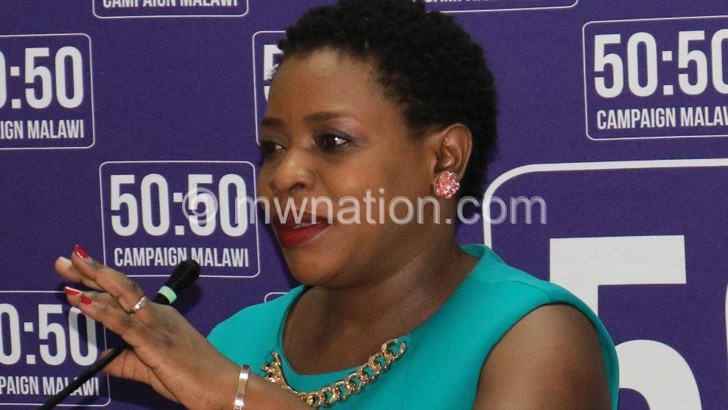Strides in 50-50 Campaign—Malera
How would you describe your stint at ActionAid Malawi
It has been an intense period of

What would be your vision for the kind of work thatActionAid should continue to do once you have left?
In line with the current development context, it wouldbe important for ActionAid to continue with the unique operational principle ofcommunity-rootedness, connectedness with the grassroots and empowerment, i.e.working through community structures, the poor and the marginalised to achievesocial justice, gender equality and poverty eradication.
ActionAid Malawi is a member of the 50-50 CampaignManagement agency alongside the Centre for Civil Society Strengthening who havecome up with a variety of innovations to ensure more women win in the 2019elections. However, some female aspirants are not satisfied with the mode ofinterventions that you have undertaken. Why do you think that is the case?
That’s an interesting perspective. I would attributesuch sentiments to a number of factors, the fundamental one being that therehave been some expectations on the part of some of the women. These are notaligned to the programme design due to applicable rules. From the onset of theprogramme, we have been engaging the women to clarify on the expectations.However, the funders have been engaged, and wherever possible we arereprogramming. This far, in a bid to meet some of the needs, provision has beenmade for some material support, communication and fuel subsidies, as well asprovision of payment of nomination fees for eligible candidates, assistance inmonitoring of the elections, provision of legal assistance in addition to capacitybuilding and community mobilization interventions. However, this far the oneunmet expectation over which concerns have been raised is the demand for cashdisbursements to the women. This seems to be one of the sources of thedissatisfaction. In addition, the challenge of the delayed start of theprogramme has been raised. This cannot be attributed to the agency alone. Foras long as there is no dedicated funding through the national budget, the issueof when the programme starts and sustaining the interventions from one electionto the next will always depend on when the donors/partners release funds forthe programme. Suffice to mention that this time around implementation startedquite early as the funds were released in December of 2017.
Do you foresee the 50:50 campaign in 2019 being asuccess?
Certainly yes, we will see a progression towards the50:50 target. A multiplicity of factors is working for the attainment of apositive outcome. Thanks to the efforts in previous campaigns, and continuousefforts in transformative gender approaches various players are making, thepredominant stereotypical narrative that has confined women’s role to ‘thekitchen’ is changing, and so have the social norms that have underpinned thesenotions. Evidence shows that the electorate is ever than before ready toprovide a vote to female candidates based on their capabilities. There is anever-increasing buy-in from the communities into the need for equalrepresentation and participation of women and men in politics. While there arestill some challenges, political parties are also demonstrating willingness tosupport female candidates. Implementers of the campaign are vigilantly engagingthe political parties to ensure this is followed through with demonstrableactions. Most importantly, the calibre and determination of the women that havestepped out to push the frontiers and claim women’s rightful spaces in thisheavily male-dominated arena is impressive.
You joined ActionAid Malawi at a time the organisationwas designated the principal recipient of the non-biomedical component of theJoint TB/HIV Global Fund Grant. How would you measure your performance in thatarea?
That the country is on course towards meeting theUNaids global 90:90:90 target in relation to HIV and Aids tells a very positiveand success story of Malawi, one based on collective efforts in the nationalresponse, including the contributions of organisations such as ActionAid Malawiand its partners and the community structures we work with. While there havebeen challenges in delivery, there was a significant level of achievement ofthe performance targets under the 2015 to 2017 Grant. Similarly, in the currentGrant of 2018 to 2020, we are making considerable progress in delivering on theperformance targets. In the first six there were some hiccups, especiallyrelating to lengthy and tedious contracting processes which delayed the startof activity implementation. However, as we end the second half of the firstyear, we are on course and performance is looking good. As we move into thesecond year we can only harness on this progress and ensure optimalperformance.
There have been allegations of abuse of funds fromGlobal Fund by some civil society organisations. What would you say hasprompted these allegations and what is your response to them?
The response by ActionAid is to respect the mandate
Having played a major role on the human rights platform in Malawi, what next for Grace Malera?
A rather challenging question. I would say, I am still very much around in the human rights/gender and development sector and will continue to pursue my interest and passion of promoting and protecting the human rights of vulnerable, marginalised and excluded persons and communities





